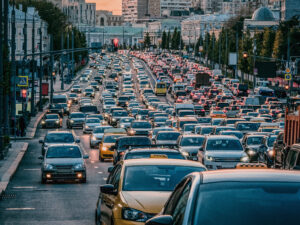The travel and hospitality sector is facing a dramatic rewrite of the traditional SEO playbook. As generative AI and LLMs like ChatGPT, Perplexity, and Grok capture user attention, traditional search traffic is evaporating, and the implications for hotels, airlines, and food and beverage brands are seismic.
We predicted a number of these changes in our Travel Trends piece earlier this year. In this article James Gray, VP Digital Marketing, unpacks some of the startling statistics as a result of the more recent changes in search behaviour and technology; and explores what this shift means for brands from hotels to airlines and restaurants to cafes.
We have seen alarming stats flying around recently, like reports from SEMrush: 18–64% traffic drops on sites where AI Overviews now dominate key search results.
In the US and Europe, zero-click searches, where users get answers from search engines or AI tools without ever clicking through, are now reportedly upwards of 58–60%!
What does this mean? Every hotel, airline, or restaurant relying on informational queries like “best hotels in Rome” or “top European airlines 2025” risks losing up to two-thirds of its organic clicks.

These systemic blind spots mean many brands are flying blind, just as the search ground shifts beneath them.
There’s also some interesting stats when we look at ranking longevity: the average #1 page is now 5 years old, up from just 2 years old in 2017. Brand-new content rarely breaks in, only 1.74% of new pages hit the top 10 within a year – a startling statistic for brands churning out content at scale in the hope of fast movement up the SERPs.
For travel brands constantly pumping out fresh deals and itineraries, this trend is pretty problematic. The answer to meeting these shifting needs in content and search user behaviour isn’t necessarily just “create loads of new human-centric content” which seems to be the rhetoric in the general SEO community.

There’s a twist: whilst top-of-funnel informational traffic shrinks, deeper funnel queries still drive real, high-intent (often transactional) visits. We saw this in our webinar with Lalit Gupta from Google, where he highlighted the shift in travel search behaviours, one of significantly longer queries. This could lead to higher on-site conversion rates. Although, these should be taken with a pinch of salt, and not skew marketers’ perspectives on conversion success.
In essence: fewer visits overall, but a higher concentration of intent. For travel brands, this could mean smaller, more loyal audiences, but ones with much stronger conversion potential.
| Challenge | Strategic Response |
| No-click searches from AI/SGE | Optimise for AI/SERP snippets and brand SEO. Structure data clearly for AI overview eligibility. |
| Query tracking fails in GSC/Discover | Adopt third-party AI analytics, track referral from major LLMs (ChatGPT, Perplexity). Reconcile with internal data. |
| Aging content ranking & CTR decay | Refresh cornerstone content regularly. Build brand equity and E-E-A-T, essential for AI visibility (searchengineland.com, seocom.agency, theverge.com). |
| Homepage & product page focus | Ensure homepage communicates brand quickly; product or booking pages must be lightning-fast, purpose-built for AI engines to serve. |
| Multimedia demand | Embed short, snackable videos – YouTube Shorts, TikTok clips etc, to boost visibility inside AI Overviews . |
The Remarkable team of digital marketing specialists are on hand with a range of solutions to help you audit your visibility and optimisation for future of search.
Travel brands that cling to legacy SEO tactics may find themselves caught in a dwindling click funnel. The most successful companies will be those who adapt: optimising content for AI, focusing on high-conversion site portals, and injecting brand value where it still counts.
The travel industry is already feeling the seismic shift. The question is: are you ready to make the most of it?
Remarkable are one of the world’s leading digital experience agencies. As a double Platinum Sitecore and Optimizely partner, we offer technology solutions to help brands build experiences that convert.